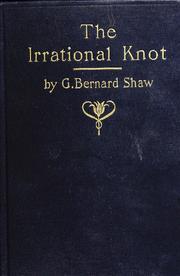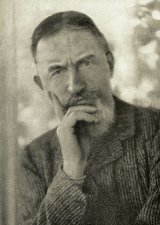The Irrational Knot Page #11
The Irrational Knot was first published in 1905, having been written in 1880. Within a framework of leisure class preoccupations and frivolities Shaw disdains hereditary status and proclaims the nobility of workers. Marriage, as the knot in question, is exemplified by the union of Marian Lind, a lady of the upper class, to Edward Conolly, always a workman but now a magnate, thanks to his invention of an electric motor that makes steam engines obsolete. The marriage soon deteriorates, primarily because Marian fails to rise above the preconceptions and limitations of her social class and is, therefore, unable to share her husband's interests.
"You dont seem used to this sort of thing," said Lind, somewhat disgusted. "It was well sung," replied Conolly "--better than most of these blackguards know." "Then why dont you clap?" "Because she is not giving herself any trouble. That sort of thing, from a woman of her talent, is too cheap to say 'thank you' for." Marmaduke looked at him, and began to think that he was a priggish fellow after all. But as the burlesque went on, Mademoiselle Lalage charmed away this disagreeable impression. She warbled in an amorous duet, and then sang the pleasures of champagne; tossing her head; waving a gilt goblet; and, without the least appearance of effort, working hard to captivate those who were to be won by bold smiles and arch glances. She displayed her person less freely than her colleagues, being, not more modest, but more skilful in the art of seduction. The slang that served for dialogue in her part was delivered in all sorts of intonations, now demure and mischievous, anon strident and mock tragic. Marmaduke was delighted. "What I like about her is that she is such a genuine little lady," he said, as her exit released his attention. "With all her go, she is never a bit vulgar. Off the stage she is just the same. Not a spark of affectation about her. It is all natural." "You know her, then?" said Conolly. "I should think I do," replied Marmaduke, energetically. "You have no idea what a rattling sort she is." "To you, who only see her occasionally, no doubt she gives--as a rattling sort--a heightened charm to the order, the refinement, the--the beauty of the home life which you can enjoy. Excuse my introducing such a subject, Mr. Lind; but would you bring your cousin--the lady who sang to-night at the concert--to see this performance?" "I would if she asked me to," said Marmaduke, somewhat taken aback. "No doubt. But should you be surprised if she asked you?" "Not a bit. Fine ladies are neither such fools nor such angels as you--as some fellows think. Miss Lind's notion is to see everything. And yet she is a thoroughly nice woman too. It is the same with Lalage there. She is not squeamish, and she is full of fun; but she knows as well as anybody how to pull up a man who doesnt behave himself." "And you actually think that this Lalage Virtue is as respectable a woman as your cousin?" "Oh, I dont bother myself about it. I shouldnt have thought of comparing them if you hadnt started the idea. Marian's way is not the other one's way, and each of them is all right in her own way. Look here. I'll introduce you to Lalage. We can pick up somebody else to make a party for you, and finish with a supper at Jellicoe's." "Are you privileged to introduce whom you like to Miss Lalage?" "Well, as to that, she doesnt stand much on ceremony; but then, you see, that cuts two ways. The mere introducing is no difficulty; but it depends on the man himself whether he gets snubbed afterward or not. By the bye, you must understand, if you dont know it already, that Lalage is as correct in her morals as a bishop's wife. I just tell you, because some fellows seem to think that a woman who goes on the stage leaves her propriety behind as a matter of course. In fact, I rather thought so myself once. Not that you wont find loose women there as well as anywhere else, if you want to. But dont take it for granted, that's all." "Well," said Conolly, "you may introduce me, and we can consider the supper afterwards. Would it be indiscreet to ask how you obtained your own introduction? You dont, I suppose, move in the same circle as she; and if she is as particular as your own people, she can hardly form promiscuous acquaintanceships." "A man at the point of death does not stop to think about etiquet. She saved my life." "Saved your life! That sounds romantic." "There was precious little romance about it, though I owe my being alive now to her presence of mind. It happened in the rummest way. I was brought behind the scenes one night by a Cambridge chum. We were painting the town a bit red. We were not exactly drunk; but we were not particularly sober either; and I was very green at that time, and made a fool of myself about Lalage: staring; clapping like a madman in the middle of her songs; getting into the way of everybody and everything, and so on. Then a couple of fellows we knew turned up, and we got chatting at the wing with some girls. At last a fellow came in with a bag of cherries; and we began trying that old trick--you know--taking the end of a stalk between your lips and drawing the cherry into the mouth without touching it with your hand, you know. I tried it; and I was just getting the cherry into my mouth when some idiot gave me a drive in the waistcoat. I made a gulp; and the cherry stuck fast in my throat. I began to choke. Nobody knew what to do; and while they were pushing me about, some thinking I was only pretending, the girls beginning to get frightened, and the rest shouting at me to swallow the confounded thing, I was getting black in the face, and my head was bursting: I could see nothing but red spots. It was a near thing, I tell you. Suddenly I got a shake; and then a little fist gave me a stunning thump on the back, that made the cherry bounce out against my palate. I gasped and coughed like a grampus: the stalk was down my throat still. Then the little hand grabbed my throat and made me open my mouth wide; and the cherry was pulled out, stalk and all. It was Lalage who did this while the rest were gaping helplessly. I dont remember what followed. I thought I had fainted; but it appears that I nearly cried, and talked the most awful nonsense to her. I suppose the choking made me hysterical. However, I distinctly recollect the stage manager bullying the girls, and turning us all out. I was very angry with myself for being childish, as they told me I had been; and when I got back to Cambridge I actually took to reading. A few months afterward I made another trip to town, and went behind the scenes again. She recognized me, and chaffed me about the cherry. I jumped at my chance; I improved the acquaintance; and now I know her pretty well." "You doubt whether any of the ladies that were with us at the concert would have been equally useful in such an emergency?" "I should think I do doubt it, my boy. Hush! Now that the ballet is over, we are annoying people by talking." "You are right," replied Conolly. "Aha! Here is Miss Lalage again." Marmaduke raised his opera-glass to his eyes, eager for another smile from the actress. He seemed about to be gratified; for her glance was travelling toward him along the row of stalls. But it was arrested by Conolly, on whom she looked with perceptible surprise and dismay. Lind, puzzled, turned toward his companion, and found him smiling maliciously at Mademoiselle Lalage, who recovered her vivacity with an effort, and continued her part with more nervousness than he had ever seen her display before.
Translation
Translate and read this book in other languages:
Select another language:
- - Select -
- 简体中文 (Chinese - Simplified)
- 繁體中文 (Chinese - Traditional)
- Español (Spanish)
- Esperanto (Esperanto)
- 日本語 (Japanese)
- Português (Portuguese)
- Deutsch (German)
- العربية (Arabic)
- Français (French)
- Русский (Russian)
- ಕನ್ನಡ (Kannada)
- 한국어 (Korean)
- עברית (Hebrew)
- Gaeilge (Irish)
- Українська (Ukrainian)
- اردو (Urdu)
- Magyar (Hungarian)
- मानक हिन्दी (Hindi)
- Indonesia (Indonesian)
- Italiano (Italian)
- தமிழ் (Tamil)
- Türkçe (Turkish)
- తెలుగు (Telugu)
- ภาษาไทย (Thai)
- Tiếng Việt (Vietnamese)
- Čeština (Czech)
- Polski (Polish)
- Bahasa Indonesia (Indonesian)
- Românește (Romanian)
- Nederlands (Dutch)
- Ελληνικά (Greek)
- Latinum (Latin)
- Svenska (Swedish)
- Dansk (Danish)
- Suomi (Finnish)
- فارسی (Persian)
- ייִדיש (Yiddish)
- հայերեն (Armenian)
- Norsk (Norwegian)
- English (English)
Citation
Use the citation below to add this book to your bibliography:
Style:MLAChicagoAPA
"The Irrational Knot Books." Literature.com. STANDS4 LLC, 2024. Web. 23 Dec. 2024. <https://www.literature.com/book/the_irrational_knot_7>.




Discuss this The Irrational Knot book with the community:
Report Comment
We're doing our best to make sure our content is useful, accurate and safe.
If by any chance you spot an inappropriate comment while navigating through our website please use this form to let us know, and we'll take care of it shortly.
Attachment
You need to be logged in to favorite.
Log In